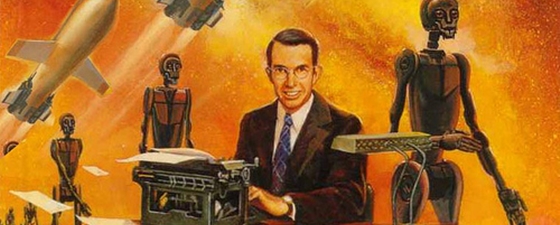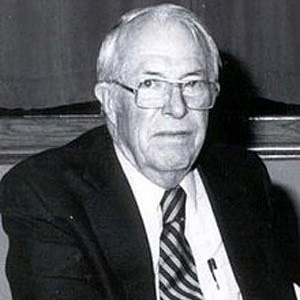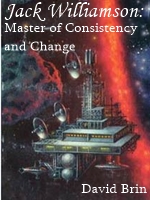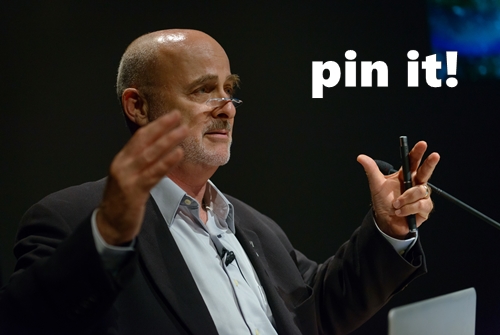
There is a legend.
It tells how once a clever Yankee trader routed a Chinese wizard in a business deal. Soon, the enchanter regretted the transaction. Watching furiously as his treasure was rowed out to a waiting Clipper ship, the fuming magician vowed revenge on the clever merchant. He gathered all the dwindling power-manna of his region, and while the merchant was still in range to hear, the wizard hurled his mightiest spell.
For ten generations shall this fate befall you... and not only you, but your nation and your all people, as well: "May you live in interesting times!"
It is a traditional curse and one with fearsome implications to any Chinese. For during their long millennia of history, it has nearly always been better to endure boring placidity and sameness than the event-filled times that concern record-keepers — floods, wars, famines, and civic unrest — the very things the wizard now wished on his enemy's home and kin.
But magic has strange traits. It is neither as democratic as a bullet nor dispassionate as a bomb. The subjective power of a spell depends as much on the mental state of the recipient as on the one who casts it. In this case, the "victim" was American, an explorer. And though fluent in Chinese, our merchant captain did not quite perceive the magician's words the way they were meant.
"May you live in interesting times!"
On hearing this, the surprised Yankee blinked a few times at the wizard on the dock. Then he smiled broadly and replied — "Gee... thanks!"
Jack Williamson is no Yankee trader, but he might have been. His life is one long tale of hoodwinking fate, of turning adversity into advantage, and above all, changing the world through the sheer magic of his perceptions. By seeing the universe in a new way — and conveying his vision through science fiction — Williamson helped break the old spell that held human beings enthralled for so long. The tradition of static sameness. The old fear of innovation.
He helped make the world we live in. A world in love with change.
That is hardly a destiny anyone might have predicted for John Stewart Williamson, when he was born in Bisbee Arizona, in April, 1908. At just six weeks of age, his parents took him by wagon and then mule-back to a threadbare ranch, high in the Sierra Madre mountains of Sonora, Mexico — only the latest in a series of hopeful family migrations that had drawn the Williamson clan onward throughout the period known as the Wild West. With each failed venture the final option had always been to pack up and try somewhere else, until, when Jack was seven years old, the clan finally stopped their covered wagon near Portales, New Mexico, where Jack lives to this day.
Jack often cites Walter Prescott Webb's famous appraisal of the American psyche — that it was forged by the Great Frontier. Early in this century, pundits were predicting that the American character would change once the last open spaces were fenced. They said the nation's mood of expansive optimism, of hope and endless opportunity, could not survive once people lacked a place to run away. A place for dreams to go.
Jack always agreed with this assessment. But then, who says the frontier is gone? Who says it ever has to go away?
Born into a hard life, bullied by other children and ever-lonely in his poverty, young Jack Williamson cast around for his own borderlands, eventually finding them in both science and science fiction. Held up against the backdrop of his wooden shack, the lurid cover of a pulpy 1927 issue of Hugo Gernsback's Amazing Stories seemed to frame the outlines of a doorway. A door Jack shouldered open with all the spirit he could muster.
In those days, the written word was like a lifeline. It told of faraway goings-on. Of flying machines and great wars, of towering buildings and experiments with that fabric of matter. It hinted of new ways to look at time and space. Not far from where Jack lived, Goddard was beginning the Age of the Rocket.
Nearly all past civilizations seem to have shared a deep, archetypal belief that there was once a Golden Age — a shining time when people were better, knew more, and were closer to the gods. Heights from which we fell and can never aspire again. Under such a world-view, Truth was to be found in a tribe's oldest text, and change was seen, at best, with deep suspicion.
Amazing Stories helped proselytize a new faith — a heretical creed that dared to place a golden age not in some pined-for past, but in the future, something difficult to attain, but worth striving for, achievable not through prayer alone, but mostly by hard work and vision. Naturally, this heresy was not highly regarded by society's guardians. At one point, a psychiatrist offered to "cure" Jack of the affliction of writing science fiction. But the addiction is a hard one to give up. Jack Williamson was never cured, never drawn back to the old religion.
We fellow heretics can be deeply thankful for that.
It is a strange belief system, this zeigeist that I sometimes call the "Dogma of Otherness." Enthusiasm and eccentricity are virtues, while any degree of fanaticism is apostasy. In the 1950s, when certain SF editors and authors began touting pseudo-Freudian cure-alls, psychic star drives and cynical religions, Jack Williamson was among those who told the truth about attractive myths — that wish-fulfillment is fine on the pages of an adventure story. Our metaphors can express wonder, danger and a vast universe of possibilities. But in real life it is the give-and-take of skeptical enquiry that drives the honest human quest for wisdom. Science Fiction has no altars, nor priests or gurus... though we do have a saint or two.
I devoured my own share of SF during a lonely youth, often without bothering to note the authors on the cover. Later I learned, to my amazement, that the creator of the pulpy, fun Legion of Space series was the same man who penned The Trial of Terra, one of the most deeply moving books ever to muse on humanity's long, hard climb out of ignorance. On reflection, I saw how much Williams's unforgettable character, Giles Habibula, owed to Shakespeare's Falstaff, and how Habibula in turn inspired Poul Anderson's unforgettable Nicholas Van Rijn... a continuity of homage that continues to this day. (My own Pedro Manella would have been a poor shadow of himself without such inspiration.)
Although his roots sink deeply into an Eastern New Mexico oasis, where he was long a beloved professor of English and Linguistics, Jack Williamson always loved to travel — from an early, Twain-like trip down the Mississippi in a small boat with Edmond Hamilton, to later expeditions in China, Russia and Egypt with his wife, Blanche. Were all those space adventures just a way to go sightseeing where his body could not go? In taking readers to a Dyson Sphere, or the Oort Cloud, or the gritty Mars of Beachhead, Jack always seems to be saying — this isn't just a fantasy. This is a might-be!
Might-bes can be frightening. The best often are. With Folded Hands enabled Jack to present one of the most chilling explorations of a human future I have ever read. One in which our creations betray us by doing exactly what they had been told. Rejecting the clichéd villains that fill most movies and thrillers — typically blood-soaked and bent on doing harm — Jack instead crafted the Humanoids, virtually omnipotent robot beings whose sole objective is to serve humankind, cherishing and keeping us from harm, preventing us from engaging in any risky pastime, even unsupervised sex.
This was not the first time a writer portrayed people oppressed by their creations. Nor did Jack invent the phrase — be careful what you wish for. But in the literal-minded humanoids, he conveyed with brilliant originality a danger we may someday face, when our servants turn around on us, programmed with nothing but kindness.
Other ideas have poured across Williamson pages — even during years that Jack humbly calls "unproductive." Explorations in linguistics, early depictions of organ transplantation (and associated crime), and the original notion that we may someday send machines to the stars — programmed to construct human colonists at the end of their long voyage. All the way up to the recent "Mars Movement" of the early nineties, Jack has been attuned to the latest trends, pitching his own contributions alongside those of much younger writers.
In collaboration with Frederik Pohl and others, he continues to blaze new trails. Beyond being chosen as the second-ever Grand Master of Science Fiction by the Science Fiction Writers of America, Jack's honors include a Hugo Award for best non-fiction work, in his fascinating autobiography — Wonder's Child: My Life in Science Fiction.
Perhaps one of Jack's greatest contributions will have been his work in "legitimizing" the field he loves. Of course SF never needed the approval of stodgy academics in order to become the most vibrant form of popular literature. But it is satisfying at last to see so many universities recognize this with courses and programs in science fiction.
Working alongside James Gunn and others, Jack was a pioneer in overcoming smug campus attitudes, patiently gathering the resources needed by researchers and teachers who yearned to explore this literature of the new frontier. For these and other lifetime efforts, a newly discovered asteroid was named Jackwilliamson 1994. A twinkling memento — one that Jack would love to see melted down someday, and turned into wondrous things.
For those of us lucky enough to know him, Jack Williamson is most cherished as friend and role model. In a world thick with self-righteousness and egotism, where individuality is extolled above manners or citizenship, Jack has shown generations of new writers that one needn't be insolent in order to be noticed.
Vanity is a tempting impediment that helps no one to be great. In his gentle modesty and calm persistence, Jack Williamson lives the word, "gentleman." He sets an example for those who all-too-often get caught up in the momentum of our own ideas, so transfixed by the sound of our own voices that we forget to listen.
Jack's friends often jest that he'll likely outlive us all. But the joke has a fringe of respectful wonder. For nothing seems impossible to Jack Williamson. His work, spanning most of the century, inspired countless minds to veer toward science and wonder, away from nihilism and despair. If anyone helped make this civilization — if anyone deserves to see where it all finally winds up taking us — it is this man.
Jack Williamson has always believed in a world in love with change.

ADDENDUM (from November 10, 2006)
Aw.... what a bummer. Today I heard that the Dean of Science Fiction — and my dear friend — was gone.
Like many others, I thought Jack was genuinely invulnerable. One of the sweetest and most genuine people I ever met, a man whose life and vision spanned farther than most of us can imagine or even dream.
It wasn't just that he helped pioneer the most truly American of all literary genres, the one obsessed (as he was) with change and frontiers. Nor the relentless example that he set, continuing to write (good stuff!) until age ninety-seven. Nor the inspiration of his dynamic life. Nor the unflagging optimism. Nor Jack's unfailing kindness, with never a word of ill will or malignant gossip toward anyone else (at least that I ever heard.)
No, I believe that most striking thing about Jack Williamson was also the work-of-art that his simple, modest life became over the years, when viewed in awe from the outside.
Some highlights: Crossed plains as a child in a homesteading covered wagon (seriously). Rafted down the Mississippi like Tom Sawyer. Was diagnosed "insane" because he liked science fiction. Originated many of the truly original ideas of our age. Became the Treasure of Eastern New Mexico. No doubt the real reason why all those Roswell Aliens kept coming. Looking for autographs, I bet.
Exactly 10 years ago, I wrote the essay above, introducing a collection in his honor. Now I must turn it to another use, as tribute to a great man. But the man carved his own memorial, in his words and books and ideas. In the authors and readers who considered themselves his daughters and sons.
He was 17 months shy of his centennial. Jack not only deserved his 100 years... we all were positive he would leave that milestone in his wake, like prairie dust. Like a trail of stars.
THE END

about this article
"Jack Williamson: Master of Consistency and Change" is published in full here. Note: while reprinting this 10 year-old tribute to my dear friend, Jack Williamson, I have also appended a memorial addendum, written on the day of his passing, November 10, 2006. Also see the wonderful biography of Jack, entitled The Williamson Effect, edited by Roger Zelazny and prefaced by David Brin, published by Tor Books.
Copyright © 1996, 2006 by David Brin. All rights reserved.
join David Brin's discussions
David Brin blogs at Contrary Brin and posts social media comments on Facebook, Twitter, Quora, and MeWe specifically to discuss the political and scientific issues he raises in these articles. If you come and argue rationally, you're voting, implicitly, for a civilization that values open minds and discussions among equals.
cited in this article
David Brin, "Survival of the Fittest Ideas"
Jack Williamson, Darker Than You Think (Kindle ebook #ad)
Jack Williamson, Five Science Fiction Stories (Unexpurgated): Salvage in Space, The Cosmic Express, The Pygmy Planet, The Lake of Light, and The Meteor Girl (Kindle ebook #ad)
Jack Williamson, The Humanoids: A Novel (Kindle ebook #ad)
Jack Williamson, The Stonehenge Gate (Kindle ebook #ad)
Jack Williamson, With Folded Hands (Kindle ebook #ad)
Roger Zelazny, ed., The Williamson Effect (book #ad)
Williamson's legacy
letting others have their say
Poul Anderson, Brain Wave
Alfred Bester, The Stars My Destination
Frederik Pohl and C. M. Kornbluth, The Space Merchants
Isaac Asimov, The Gods Themselves
Cixin Liu, The Three-Body Problem
William Gibson, Neuromancer
Arkady and Boris Strugatsky, Roadside Picnic
#AmazonCommissionsEarned
a brief intro to author David Brin

novels
David Brin's science fiction novels have been New York Times Bestsellers, winning multiple Hugo, Nebula and other awards. At least a dozen have been translated into more than twenty languages. They range from bold and prophetic explorations of our near-future to Brin's Uplift series, envisioning galactic issues of sapience and destiny (and star-faring dolphins!).
Learn More
shorter fiction
Short stories and novellas have different rhythms and artistic flavor, and Brin's short stories and novellas, several of which earned Hugo and other awards, exploit that difference to explore a wider range of real and vividly speculative ideas. Many have been selected for anthologies and reprints, and most have been published in anthology form.
Learn More
Contrary Brin blog
Since 2004, David Brin has maintained a blog about science, technology, science fiction, books, and the future — themes his science fiction and nonfiction writings continue to explore.
Learn More
social media influencer
Who could've predicted that social media — indeed, all of our online society — would play such an important role in the 21st Century — restoring the voices of advisors and influencers! Lively and intelligent comments spill over onto Brin's social media pages.
Learn More
scientist
David Brin's Ph.D in Physics from the University of California at San Diego (the lab of nobelist Hannes Alfven) followed a masters in optics and an undergraduate degree in astrophysics from Caltech. Every science show that depicts a comet now portrays the model developed in Brin's PhD research.
Learn More
transparency expert
Brin's non-fiction book, The Transparent Society: Will Technology Force Us to Choose Between Freedom and Privacy?, continues to receive acclaim for its accuracy in predicting 21st Century concerns about online security, secrecy, accountability and privacy.
Learn More
speaker & consultant
Brin speaks plausibly and entertainingly about trends in technology and society to audiences willing to confront the challenges that our rambunctious civilization will face in the decades ahead. He also talks about the field of science fiction, especially in relation to his own novels and stories. To date he has presented at more than 200 meetings, conferences, corporate retreats and other gatherings.
Learn More
future/tech advisor
Brin advises corporations and governmental and private defense- and security-related agencies about information-age issues, scientific trends, future social and political trends, and education. Urban Developer Magazine named him one of four World's Best Futurists, and he was appraised as "#1 influencer" in Onalytica's Top 100 report of Artificial Intelligence influencers, brands & publications. Past consultations include Google, Microsoft, Procter & Gamble, and many others.
Learn More



